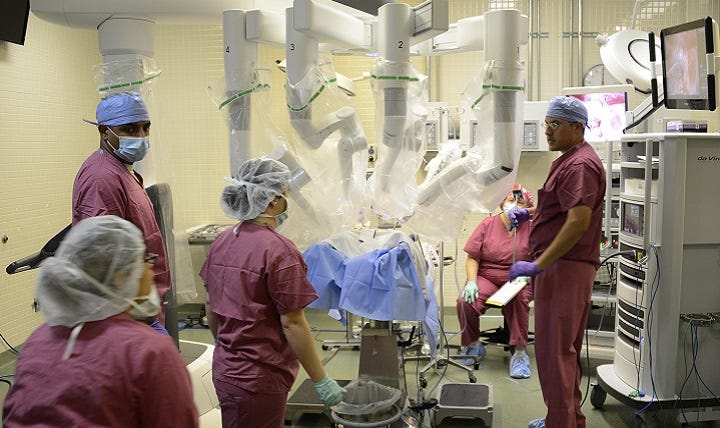Latest news about Bitcoin and all cryptocurrencies. Your daily crypto news habit.
 2019 — the year of AI?
2019 — the year of AI?
If everything goes right, one chilly January morning, you won’t ever need to make New Year’s resolutions. Your fitness tracker will remind you to take an evening run to match your goals. Your sleep monitor will make sure you’re getting proper rest each night, something you promised yourself you would monitor. And, if you’re planning to lose some weight, your smartphone might warn you when your caloric intake is exceeding your daily limit, or even pester you to take a different route home to avoid the temptation of golden arches, golden corrals, golden woks, and other restaurants that sport precious metal names for precious little nutritional content.
To get to this future, however, we’ll need artificial intelligence that’s more powerful, ubiquitous, and transparent. We’ll also need to carefully navigate between wise ethical considerations and mindless bureaucratic regulations.
So, in this article, led by experts and thought leaders in the AI space, we’ll review some possible New Year’s resolutions for AI developers and entrepreneurs as they face what might be a watershed year for AI technology.
Resolution 1: Consider Ethics First
Fabian Westerheide, founding managing partner of Asgard and an international expert on artificial intelligence strategy, entrepreneur and venture capitalist, writes in his own outlook on 2019 that ethical questions, which came into the spotlight in 2018, will become even important in the coming year. He mentions the tug between privacy and security in technologies, such as facial recognition and social scoring systems, as hot button ethical debates that won’t go away in 2019.
“With the emergence of more AIs and increasing abundance of data, we must continue asking important questions around AI ethics,” Westerheide writes. “Since Artificial Intelligence represents the world of its creators, AI also inherits human biases and prejudices.”
Just about every industry will be touched by AI — and that means developers and entrepreneurs will have to weigh the ethical dimensions of every AI program they implement, according to Westerheide, who heads up the Rise of AI conference, which will be held in Berlin on March 16, 2019.
“Courts already use AI algorithms to determine sentencing. Google and Facebook AIs pull your data to sell to advertisers,” writes Westerheide. “Driverless cars will use AI to determine how to act in accidents. Drones can be used in warfare. Ethics dilemmas are already happening and will continue to be more integrated in our everyday interactions with AI.”
 Investing more will be critical to AI’s development, according to experts
Investing more will be critical to AI’s development, according to experts
Resolution 2: Invest More, Research More
Westerheide adds that for AI to breakthrough, investors and government funders also need to work with teams developing AI in 2019. He expects countries that have already dominated AI R&D in the last few years to continue — and maybe even widen — their lead in the space.
“In 2019, the gap between those countries leading in AI and the rest of the world will increase,” he writes. “China, America and Israel will continue to lead in field of AI. They will attract the smartest talent, provide the best researchers and largest budgets, fund the strongest entrepreneurs and attract big digital companies to their clusters.”
To close that gap, AI developers and entrepreneurs, along with their government sponsors, need to not just spend money on research, but support it in other ways.
Westerheide writes: “Simply investing in research (like the EU Horizon 2020 program) won’t be enough. AI companies and researchers will demand access to data, sufficient funding and close ties to existing industrial players. Governments must provide these resources, and if they don’t, the industry moves on without those countries.”
Resolution 3: Collaborate More
Arguably the most exciting AI project in 2018 was SingularityNet. The project aims to decentralize AI to let anyone create, share and monetize AI services at any scale.
Ben Goertzel, CEO and chief scientist of SingularityNet, offers a resolution for the community of AI developers to become more collaborative — and not just having coffee with fellow AI enthusiasts.
“Resolution: to write AI code that will interact with other people’s AI code to yield unpredictable and exciting emergent intelligence,” Goertzel says in an email interview.
Resolution 4: Find A Niche (That Really Needs AI Right Now)
Not every business idea is ready for AI. Some niches within industries aren’t even ready for AI. However, experts suggest that niches within a bigger niche may just be the place you want to focus development in 2019. For example, while many thought leaders say that AI is already making an impact on the healthcare industry there are still areas within healthcare where developers can not only meet demand — but do a societal good.
According to Accenture:
“Growth opportunities in healthcare are hard to come by without significant investment, but artificial intelligence (AI) is a self-running engine for growth in healthcare. According to Accenture analysis, when combined, key clinical health AI applications can potentially create $150 billion in annual savings for the US healthcare economy by 2026.”
However, while tackling the entire healthcare industry might be a bit too big of a mission for small AI development teams, they might be able to find smaller niches that can use AI applications right now. John Stevens, for example, writes in a recent piece in the Next Web, that finding solutions in niches, like imaging and hospital error detection, may not just be profitable, but could save lives.
“One AI trend to watch out for in the healthcare industry is the rise of artificial intelligence in the medical imaging,” writes Stevens. “Besides the fact that AI will result in improved accuracy of medical imaging diagnosis, it will also make it much easier to personalize treatment planning and transmit results. Not only will this enhance productivity in the radiologist community, but profitability can be attained sooner than expected.”
He adds that programs in health communications could ease some of those needless medical errors, adding “Statistics show that 80 percent of serious medical errors are due to miscommunication between caregivers during patient transfer. AI can, and will, more effectively address these communication issues.”
Resolution 5: Get More Involved
Finally, Westerheide says that everyone can resolve to do more about a human-friendly transition into the AI era. He writes that the Rise conference is an example of just that type of interdisciplinary conversation.
“We’ve invited leading politicians working on AI policy, the smartest researchers, strongest entrepreneurs and best investors to present to you” he writes. “We enrich the conference with science fiction authors, priests and artists to add variety to the discussion. Use this chance to discuss the current state of AI, understand how AI can be used currently as well as in the future and meet the thought leaders for AI in person.”
He adds, “Otherwise, start the discussion yourself. Ask your parliament members what they know about AI. Visit AI events. Start companies or finance them. Initiate applied AI projects at your firm. Talk, write and blog about AI. Don’t accept that change happens. Be part of it yourself.”
Why Make an AI Resolution at All?
One of the reasons that New Year’s resolutions fail is that people lack a purpose.
According to LifeHack: “The biggest reason why most New Year’s resolutions fail: you know what you want but you not why you want it.”
For AI developers and entrepreneurs, there are lots of reasons to stick with their resolutions. In fact, there are billions — and maybe trillions — of dollars worth of reasons. That’s how much industry analysts estimate the total AI market will be worth one day. But money may not be enough.
How about the history of mankind?
Artificial Intelligence is at a critical point. Making the right resolutions might help humans create AI technology that serves people, not dominates them.
Five New Year’s Resolutions for AI Developers And Entrepreneurs was originally published in Hacker Noon on Medium, where people are continuing the conversation by highlighting and responding to this story.
Disclaimer
The views and opinions expressed in this article are solely those of the authors and do not reflect the views of Bitcoin Insider. Every investment and trading move involves risk - this is especially true for cryptocurrencies given their volatility. We strongly advise our readers to conduct their own research when making a decision.
